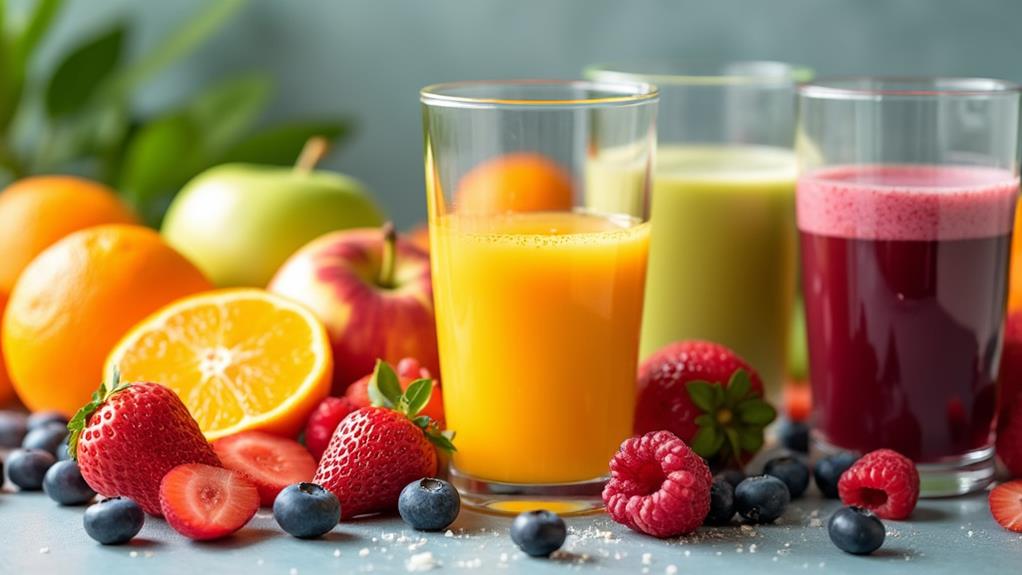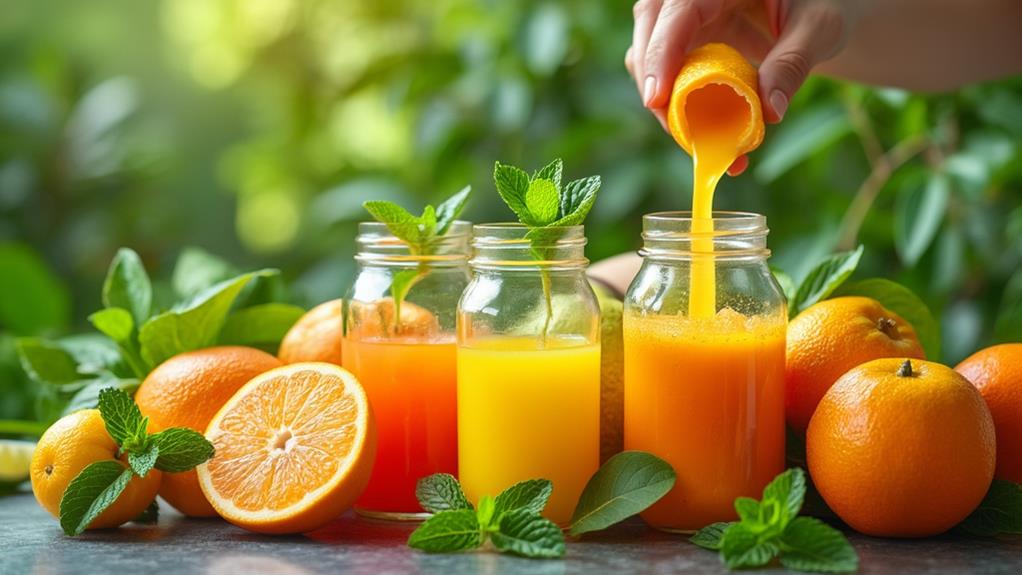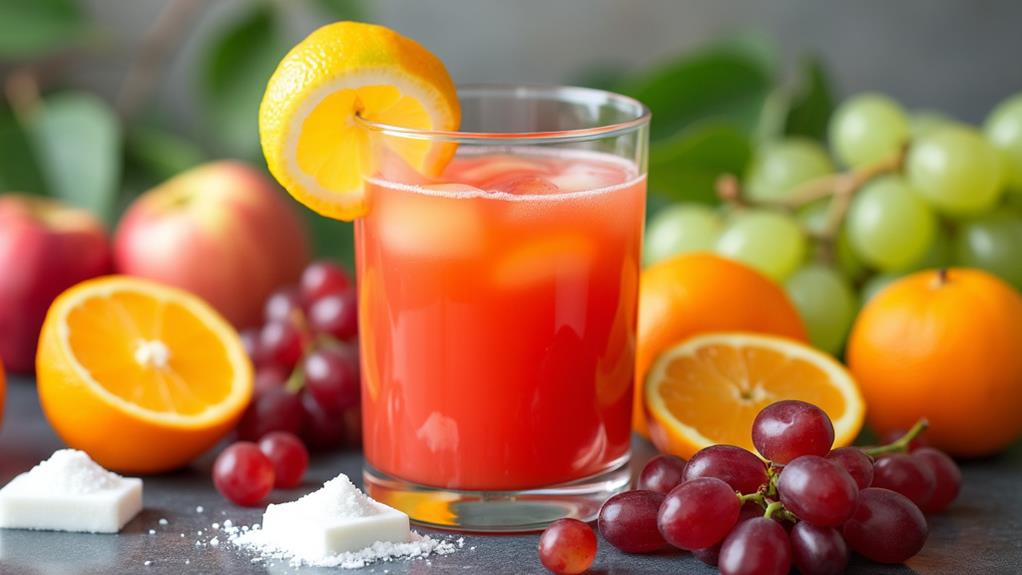What Is the Healthiest Juice to Juice?
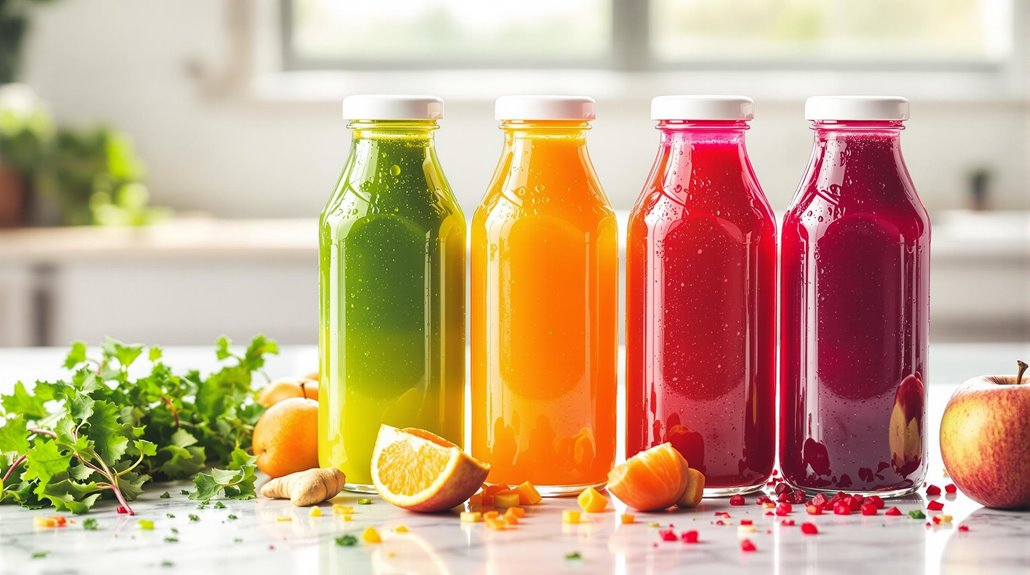
For the healthiest juice combination, you'll want to focus on nutrient-dense vegetables like beets, kale, and spinach as your base. Add carrots or green apple for natural sweetness, then enhance nutrition with ginger, lemon, or turmeric. Choose organic produce when possible and aim for a ratio of 80% vegetables to 20% fruit to keep sugar content low. Understanding specific juice combinations can help target your unique health goals and dietary needs.
Understanding the Health Benefits of Fresh-Pressed Juices
While many people turn to supplements for their nutritional needs, fresh-pressed juices offer a natural and powerful way to augment your daily nutrient intake. When you juice fruits and vegetables, you're creating a concentrated source of vitamins, minerals, and antioxidants that your body can quickly absorb and employ.
The health benefits of fresh-pressed juice are particularly significant if you struggle to consume enough whole fruits and vegetables in your diet. You'll get immediate access to nutrients that support immune function, heart health, and help prevent chronic diseases.
However, it's important to remember that juice shouldn't completely replace whole fruits and vegetables in your diet. Since juicing removes fiber, you'll want to focus on vegetable-based combinations to keep sugar content low while maximizing nutritional benefits. Using a slow juicing process helps preserve essential nutrients and enzymes by minimizing heat and friction during extraction.
Key Nutrients Found in Different Juice Types
When you investigate different types of fresh juices, you'll uncover that each variety offers its own unique nutritional profile. While whole fruits remain essential for fiber intake, certain juices pack powerful health benefits through concentrated nutrients.
- Heart-protective compounds: Pomegranate juice contains high levels of polyphenol antioxidants that support heart health, while beet juice's nitrates improve blood flow and blood pressure
- Vitamins and minerals: Low-sodium vegetable juice delivers vitamin C and potassium without excess calories, while citrus juices provide immune-boosting vitamin C
- Functional nutrients: Tart cherry juice offers specialized compounds like melatonin and tryptophan that can improve sleep quality and reduce muscle soreness
Golden and Chioggia beets provide powerful antioxidant betalains that help reduce inflammation and protect cells from damage.
Understanding these distinct nutrient profiles helps you choose the right juice for your specific health goals and dietary needs.
Best Vegetable and Fruit Juice Combinations
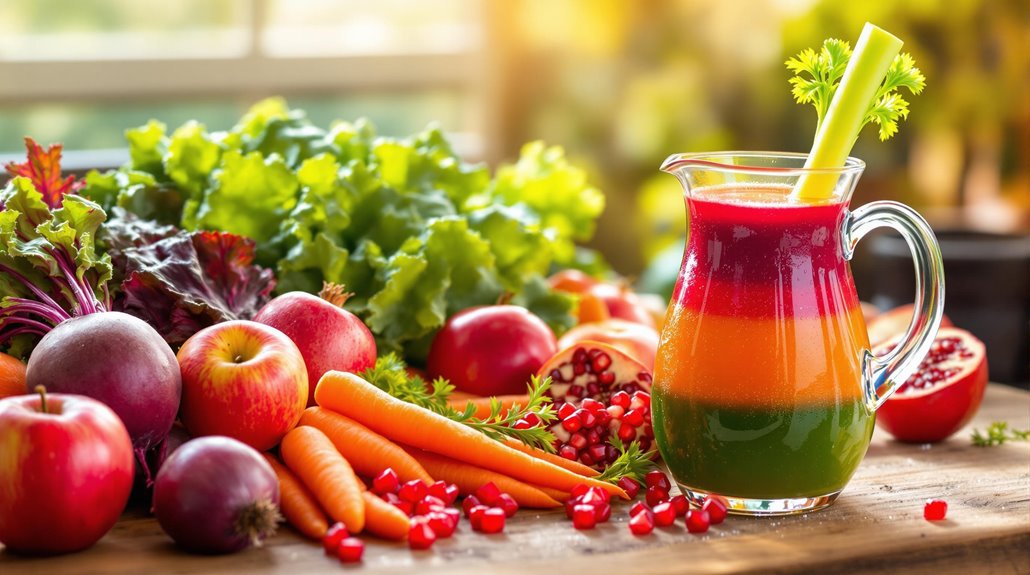
Building on our knowledge of individual juice nutrients, combining specific fruits and vegetables can create powerful synergies that maximize health benefits.
You'll find exceptional healthy combinations by pairing whole fruits and veggies strategically. Try beet, carrot, and ginger juice to enhance your athletic performance and maintain healthy blood pressure. For immune support, blend kale, apple, and lemon - it's both nutritious and revitalizing.
When you need hydration and detoxification, combine cucumber, celery, and parsley. To protect your heart and brain health, mix pomegranate, blueberry, and spinach juice. If you're dealing with inflammation or muscle soreness, blend pineapple, orange, and turmeric. Each of these fruit combinations offers unique benefits while providing concentrated nutrients in an easily digestible form.
The addition of coconut water to your juice blends helps maintain optimal hydration levels while providing a natural energy boost.
How to Choose Low-Sugar Juice Options
Since many store-bought juices contain excessive amounts of sugar, choosing low-sugar options requires careful attention to labels and ingredients. You'll want to guarantee your juice is made from 100% pure fruits or vegetables without added sugars to help maintain stable blood sugar levels.
Select vegetable-based juices like tomato or carrot blends, which naturally contain less sugar than fruit varieties. Check nutrition labels for total sugar content, aiming for less than 12 grams per serving. Dilute your juice with water or sparkling water to reduce sugar concentration.
When shopping, focus on products labeled "100% juice" and avoid those containing corn syrup, sugar, or artificial sweeteners. Vegetable juices typically offer a healthier alternative to fruit-based options, and you can always mix them to create balanced, low-sugar combinations that taste great.
The Power of Antioxidant-Rich Juices
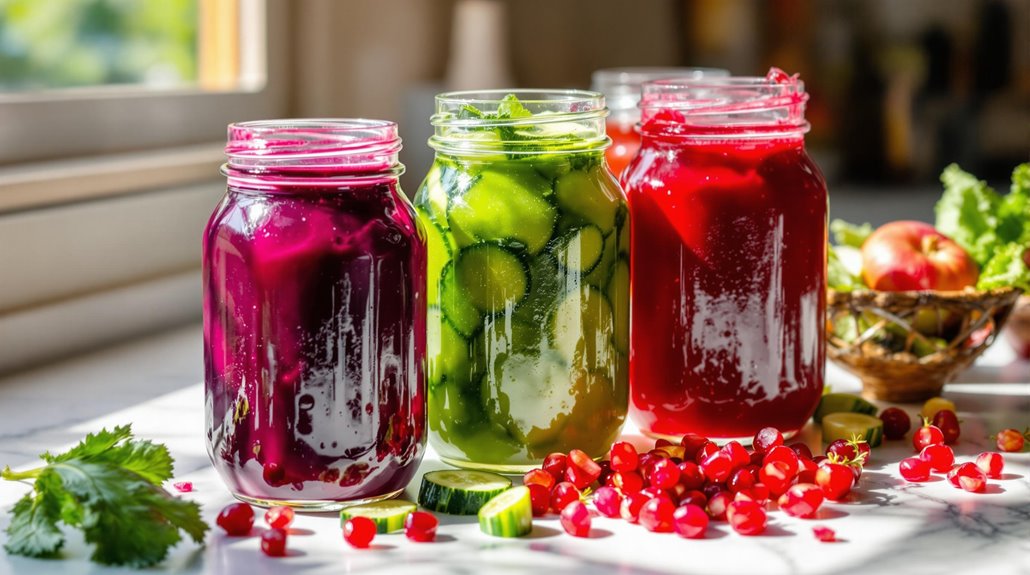
Antioxidant-rich juices offer more than just low sugar content - they provide powerful protection against cellular damage and oxidative stress.
When you're looking to enhance your antioxidant intake, pomegranate juice stands out as a superior choice, containing three times more antioxidants than green tea or red wine.
These potent compounds help neutralize free radicals in your body, which can damage cells and contribute to aging and disease. You'll find high levels of antioxidants in dark-colored juices like blueberry, blackberry, and tart cherry. They're particularly effective at fighting inflammation and supporting your immune system.
To maximize the benefits, choose cold-pressed or freshly squeezed juices rather than heat-processed options, as they retain more of their natural antioxidant properties. Consider blending different antioxidant-rich juices to create a powerful nutritional combo.
Daily Recommended Serving Sizes for Healthy Juicing
While many people enjoy fresh juices as part of their daily routine, it's crucial to understand proper serving sizes to maintain a healthy balance. Your daily intake should be moderate to avoid blood sugar spikes and unwanted weight gain.
Remember that whole fruits are always the better choice, as they provide essential fiber that juicing removes.
- For 100% fruit juice, stick to 4-6 ounces if you're serving children and 4-8 ounces for adults
- When drinking vegetable juice, you can consume 8-12 ounces daily, whether you're an adult or child
- Mix your juice with water to reduce sugar content and make your servings last longer
Top Disease-Fighting Juice Blends
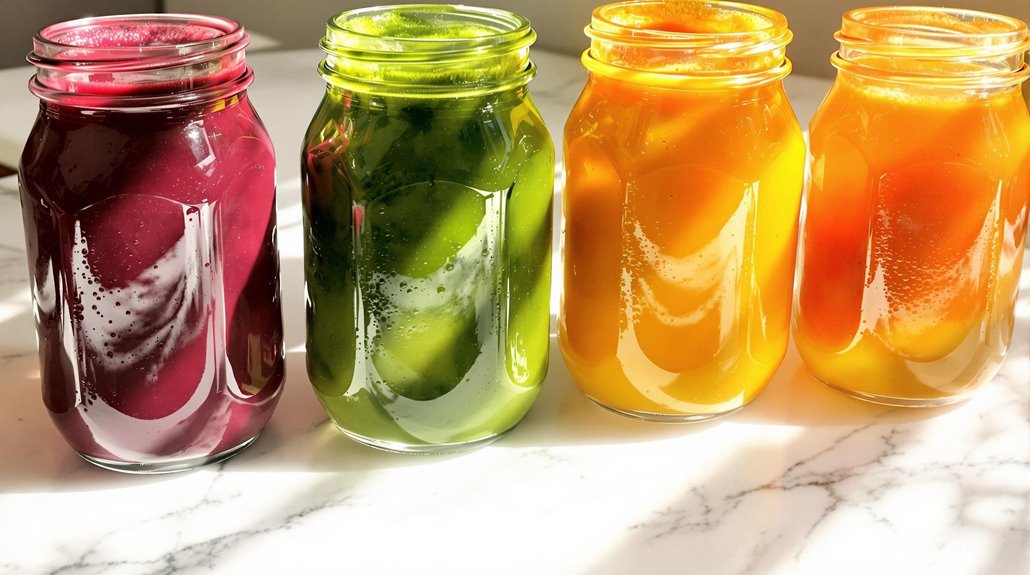
Combining specific fruits and vegetables in your juicing routine can help combat various health conditions and heighten your immune system. Start with a blend of beets, carrots, and ginger to support healthy blood vessels and reduce inflammation.
For maximum disease-fighting antioxidants, try mixing dark leafy greens like kale and spinach with tart berries and citrus fruits.
One of the healthiest juices you can make combines turmeric, pineapple, and green apple, which helps fight chronic inflammation and fortifies immunity. Don't forget to add celery and cucumber to your blends - they're excellent for reducing blood pressure and supporting kidney function.
For heart health, mix pomegranate, red grapes, and beets. These powerful combinations deliver concentrated nutrients that can help prevent illness and support your body's natural healing processes.
Comparing Store-Bought vs. Home-Juiced Beverages
Making your own juice at home offers significant advantages over store-bought alternatives, particularly when it comes to nutritional content and ingredient control. When you juice at home, you'll preserve more vitamins and antioxidants while avoiding added sugars and preservatives commonly found in commercial juices. Plus, you can save money in the long run if you're a regular juice drinker.
Home juicing lets you choose fresh, high-quality whole fruits and vegetables, ensuring maximum nutritional benefits. You can control sugar content by opting for vegetable-based juices over fruit-heavy combinations. While homemade juice is more nutritious than store-bought options, remember it shouldn't completely replace eating whole fruits and vegetables in your diet.
Consider home juicing as one way to augment your nutrient intake while maintaining control over what goes into your beverages.
Smart Ways to Incorporate Juicing Into Your Diet
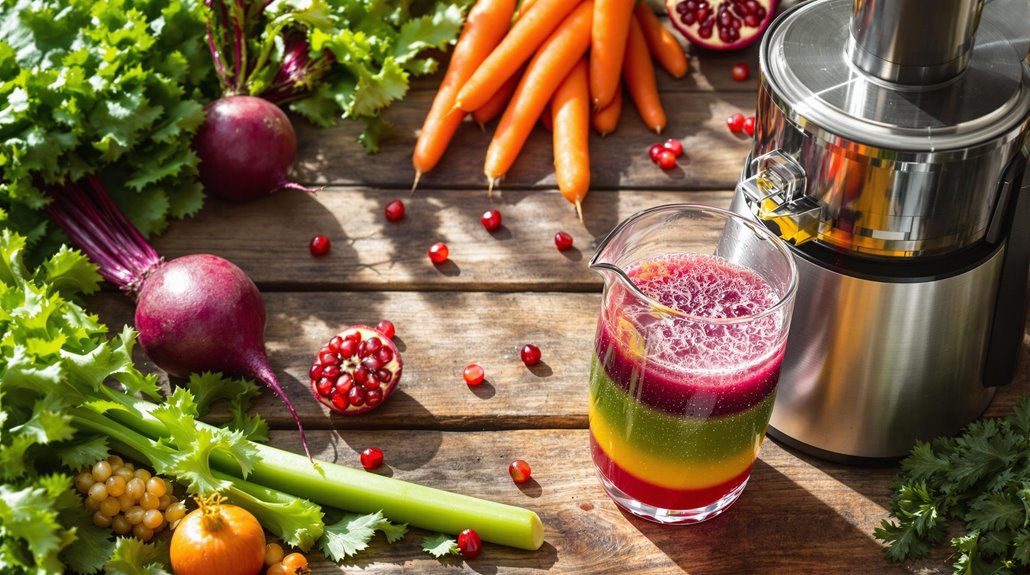
Successfully integrating juicing into your daily routine requires strategic planning and mindful consumption. Start by focusing on vegetable juices rather than whole fruits to maintain lower sugar levels while maximizing nutritional benefits. You'll want to combine various greens like kale, spinach, and Swiss chard to create nutrient-dense beverages that complement your healthy diet.
To amplify your juice's therapeutic properties, add powerful ingredients like ginger, turmeric, or cinnamon. When you need extra vitamin C, incorporate small amounts of citrus fruits. Remember to keep your portions modest - stick to 4-8 ounces daily to avoid excessive sugar intake. By treating juice as a supplement rather than a meal replacement, you'll maintain better dietary balance while reaping the benefits of concentrated nutrients from your carefully crafted combinations.


